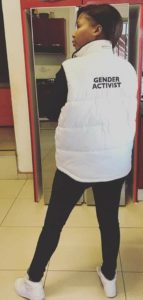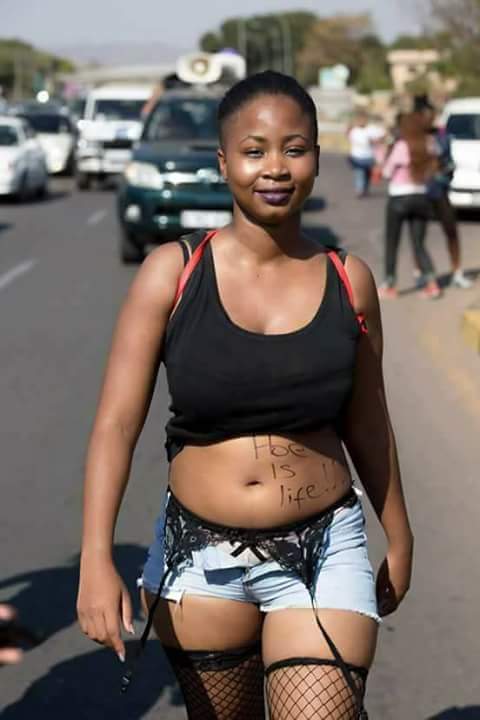On Saturday ladies in Gaborone went on a march to protest against women abuse following an incident where a young woman was stripped of her clothes for apparently dressing inappropriately.
There has been a lot of controversy surrounding the outfits worn by protesters during the weekend and some saying some saying their dress sense distorted the meaning behind the protest.
A lot of people has also come out to defend their outfits and one of the protesters Tshepo Moyo has a lot to say!
On the 3rd of June I woke up in a particularly good mood. I took a hot shower, I rubbed my body down in cocoa oil and picked my favourite pair of Victoria secret under wear. I pulled up my fish net stockings and fastened my garter. Picked the shortest shorts I had only to discover the button wouldn’t close because growing up sucks and your body doesn’t stay the size of a teenager forever; but I wore them anyway. I then joined a hundred or so other women in a march from Bus station to bus rank where I was photographed by Mathiam Basha-Agha. All these decisions did not happen to me. I made them. They are decisions informed by years of work as a human rights activist.
For those who know me they will tell you that is not my smile, that is my smirk, that is the face that I make when I am about to get up to mischief and the photographer of this photo will tell you that I gave him that shot. I knew who he was and in that moment I decided that I knew what the backlash would be. I knew my body would be on trial. That I would be shamed for my pants that wouldn’t button up because of my belly being too big, that I would be called a lesbian because of my haircut, I was well aware that my entire life would be on trial. My sexuality, my politics, my identity and even my parents would become a fair target and I must say it took way longer than I expected for the image to go viral so first things first I am not sorry. I am unapologetic and I am not a victim.
In the words of Upile author of Milk and Honey, “I am black, woman and African in a time when the world undervalues all three”. Existing in the year 2017 as a young 23 year old woman I am in a state of constant fear for my life. I am mindful of the routes I walk, the clothes I wear, how I speak every single day of my life. I have to live in a constant fear that any man I walk past could assault me and someone would tell me I deserved it because I looked at him the wrong way. This has been the case for as long as I can remember. The reality is that the young woman who was assaulted in the station could have been me on any other day of my life. So that morning when I woke up, when I joined those women I did it as deliberately as I think about my life and my safety every day and even then when I had a police escort and the company of a hundred plus women I did not feel safe. As we walked into the bus rank, the atmosphere stenches of violence, there was hatred in the eyes of those observing us, they were angry that we had decided to come into their space, that we had taken ownership of our own bodies. The entitlement to women’s bodies was clear, violent and harmful, unsurprisingly the social media comments echo the sentiments of the general public. Another unsurprising comment some women believe we are a derailment.
The biggest issues of course being, 1. How dare I have the audacity to challenge patriarchal ownership of my body not only by stripping it to bare clothing and displaying it publicly but by writing “Hoe is Life” on my body? A statement that I have claimed and identified with for years now in my quest for bodily autonomy. The idea that women’s bodies belong to the patriarchs in their societies is reinforced by the need for ownership of women’s reproductive systems. In Sylvia Tamale’s “Eroticism, sensuality and women’s secrets” she explains how the need to own reproductive systems is linked to the idea of wealth and the need to legitimize bloodlines. Basically, the view of women’s bodies as nothing but baby making machines and the consequential idea that women who reject this idea do so for the freedom to experience their fullest sexual potential and are therefore hoes.
On Saturday, I marched dressed the way I was bearing the tag hoe is life for multiple reasons, including the fact that through rejecting the notion of societies’ definition of womanhood I have been labelled a hoe multiple times, I also marched for the hoes. I marched for all the women who are told they’re womanhood does not deserve respect or even the dignity of life. I marched for the transwomen who are told they are derailing the movement, I marched for the female sex workers who are told they’re not woman enough, I marched for the women who exist on the margins of womanhood. I marched for the bad women. The ones everyone believes deserve violence and poverty. Because for as long as some women are free no woman is free. The intersections of the oppressions of gender, race, class, sexuality and ableism will forever be important to me and while to some people I crossed the line, the line needed to be crossed. And I am not sorry. I will not be sorry tomorrow. Not the day after. I will not be sorry next week either. So you should probably remember my name because this woman will be crossing the line again in the name of all the women society rejects.










